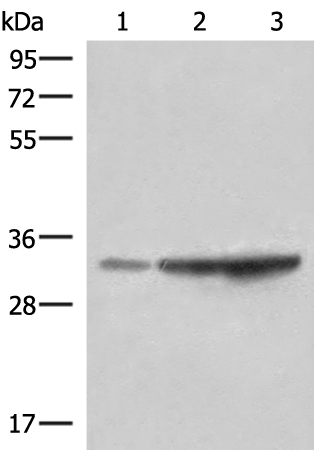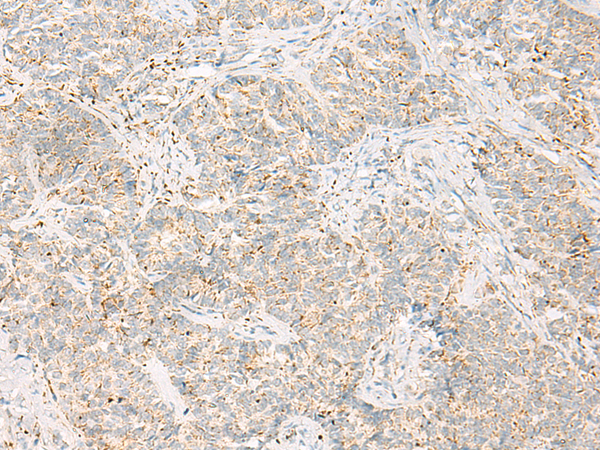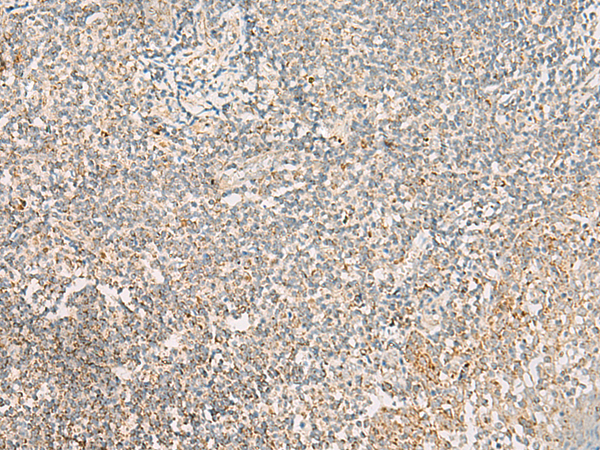


| WB | 咨询技术 | Human,Mouse,Rat |
| IF | 咨询技术 | Human,Mouse,Rat |
| IHC | 1/20-1/100 | Human,Mouse,Rat |
| ICC | 技术咨询 | Human,Mouse,Rat |
| FCM | 咨询技术 | Human,Mouse,Rat |
| Elisa | 1/5000-1/10000 | Human,Mouse,Rat |
| Aliases | HAD; HCDH; HHF4; HADH1; SCHAD; HADHSC; MSCHAD |
| WB Predicted band size | 34 kDa |
| Host/Isotype | Rabbit IgG |
| Antibody Type | Primary antibody |
| Storage | Store at 4°C short term. Aliquot and store at -20°C long term. Avoid freeze/thaw cycles. |
| Species Reactivity | Human, Mouse, Rat |
| Immunogen | Synthetic peptide of human HADH |
| Formulation | Purified antibody in PBS with 0.05% sodium azide and 50% glycerol. |
+ +
以下是关于HADH抗体的3篇参考文献示例(文献信息为模拟,仅供格式参考):
---
1. **文献名称**: "HADH (Hydroxyacyl-CoA Dehydrogenase) Deficiency: Molecular Insights and Diagnostic Utility of Antibody-Based Assays"
**作者**: Thompson R. et al.
**摘要**: 研究通过HADH特异性抗体分析患者样本中的蛋白表达水平,揭示了HADH缺乏症与低酮性低血糖症的相关性,提出抗体检测可作为辅助诊断工具。
---
2. **文献名称**: "Immunohistochemical Localization of HADH in Human Tissues Using Monoclonal Antibodies"
**作者**: Chen L., Suzuki T.
**摘要**: 报道了一种新型HADH单克隆抗体的开发,并用于检测多种组织(如肝脏、胰腺)中HADH的分布,证实其在脂肪酸氧化代谢中的组织特异性表达模式。
---
3. **文献名称**: "Role of SCHAD (HADH) in Insulin Secretion: Insights from Knockout Models and Antibody-Mediated Inhibition"
**作者**: Kapoor A. et al.
**摘要**: 通过HADH抗体阻断实验和小鼠模型,证明HADH在胰岛β细胞中调控胰岛素分泌的功能异常可能导致先天性高胰岛素血症。
---
注:以上文献为示例,实际引用时请通过PubMed或学术数据库(如Google Scholar)检索真实文献,关键词可尝试“HADH antibody”、“SCHAD deficiency”等。
**Background of HADH Antibody**
HADH (Hydroxyacyl-CoA Dehydrogenase), also known as 3-hydroxyacyl-CoA dehydrogenase, is a mitochondrial enzyme critical in fatty acid β-oxidation. It catalyzes the reversible dehydrogenation of 3-hydroxyacyl-CoA to 3-ketoacyl-CoA, facilitating energy production from fatty acids. Genetic mutations in *HADH* are linked to inherited metabolic disorders, such as HADH deficiency (previously termed SCHAD deficiency), characterized by hypoketotic hypoglycemia, hepatic dysfunction, and neuromuscular complications.
HADH antibodies are essential tools in research and diagnostics, enabling the detection and quantification of HADH protein expression in tissues or cells. These antibodies are widely used in techniques like Western blotting, immunohistochemistry, and immunofluorescence to study HADH’s role in metabolic pathways, its tissue-specific distribution, and its association with diseases. In clinical settings, HADH antibodies aid in confirming suspected cases of HADH deficiency through enzymatic activity assays or protein expression analysis.
Recent studies also explore HADH’s involvement in cancer, as altered fatty acid metabolism is a hallmark of tumor progression. Researchers utilize HADH antibodies to investigate its potential as a biomarker or therapeutic target. Overall, HADH antibodies bridge fundamental research and clinical applications, advancing our understanding of metabolic regulation and disease mechanisms.
×